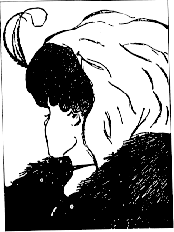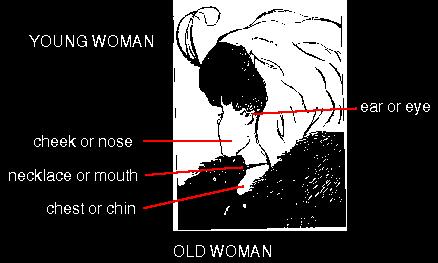
What is it 'really'?
Written 1996 by Steven LewisThe goal of training in general semantics is an evaluative state called "consciousness of abstracting." When conscious of abstracting we routinely delay our evaluations to consider the unique aspects of a situation, to gather additional data, including alternative interpretations. In the end we may not agree with an alternative interpretation, but we won't reject it without a fair hearing. To illustrate the benefits of general semantic training, I use the diagram to the left.
I ask my students to look at the diagram and tell me what they see.
Typically, some will say they see an old woman, others say they see a young woman. Students who are seeing the diagram for the first time usually see one woman, but not both, and struggle to 'see' the second woman. I spend the next few minutes helping the students see both women. By the end of the class there may be a couple of students who still cannot see both women.
 The point I make is that if we are not conscious of abstracting ... if we do not differentiate between events and objects and descriptions and inferences ... we may end our evaluations after our initial interpretation and end up in an argument over whether the image 'was really' an old woman or a young woman. If we are conscious of abstracting, we recognize that the raw sensory data are intrinsically meaningless. Our nervous system, in its endless quest for meanings, gives meanings to (interprets) these meaningless data that we then label "old woman" or "young woman." If we halt our investigation process after an initial interpretation, we may miss alternative and more appropriate evaluations.
The point I make is that if we are not conscious of abstracting ... if we do not differentiate between events and objects and descriptions and inferences ... we may end our evaluations after our initial interpretation and end up in an argument over whether the image 'was really' an old woman or a young woman. If we are conscious of abstracting, we recognize that the raw sensory data are intrinsically meaningless. Our nervous system, in its endless quest for meanings, gives meanings to (interprets) these meaningless data that we then label "old woman" or "young woman." If we halt our investigation process after an initial interpretation, we may miss alternative and more appropriate evaluations.
If we confuse our interpretations of a situation with the situation itself, we may become easily irritated, angry, intolerant, suspicious ... of people who evaluate the situation differently. If we are conscious of abstracting, we will delay our reactions while we investigate alternative interpretations. This investigatory reaction serves as a foundation of advanced science-mathematical behavior.
A similar analysis can be applied to a trip to the art museum. Some ask, "What does it mean?" as if meaning were intrinsic to the work of art. Instead, we could ask, "What does it mean to me? ... to you? ... to the artist?" Meanings and evaluations are in us. If we are conscious of abstracting, we won't project our meanings and interpretations unconsciously onto the world.
Now look again at the drawing of the women ... can you find the 'reptiles' or 'rodents' in the drawing? In 1995, after many years of using this drawing in my classes, a student showed me yet two more creatures in the drawing that I had never abstracted before!
Go to General Semantics Home Page ||| Go to Steven Lewis Home Page